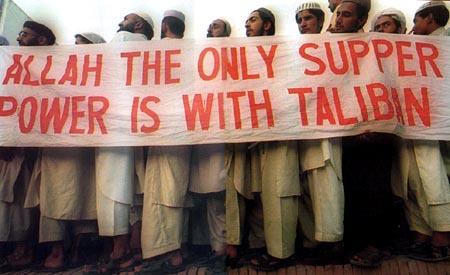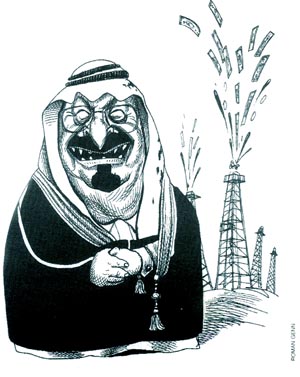 |
War against Terrorism
Stopping the Saudis:
Is this administration willing? Apparently not
Alex Alexiev
With the permission of the Author,
TIA reproduces his article published in
National Review, September 2003
The Bush administration's decision to withhold portions of the Joint Inquiry Report into 9/11 -- the sections that reportedly deal with Riyadh's support for terrorism -- is perhaps its most serious political misstep to date. It provides an opening for an attack on the president on a legitimate national-security issue -- one that, unlike the WMD and Iraq-war issues, has real substance and political traction. More importantly, the unwillingness of Washington to face up to the incontrovertible evidence that our Saudi friends are the chief financial and ideological enablers of Islamic extremism and terrorism will sooner or later hamper our ability to pursue the war on terror. In fact, there is good reason to believe that it already has, both abroad and domestically.
At first glance, the war on terror would seem to be going well. Two brilliantly planned and executed military campaigns have denied the practitioners of terror their bases of operations in Afghanistan and Iraq and the potential to develop or acquire weapons of mass destruction. This has also set the stage for a decisive and highly promising geopolitical realignment in the Middle East. Here at home, security has been enhanced and we have been able to prevent terrorist incidents since 9/11. Last but not least, we have arrested a number of top terrorist operatives, and al-Qaeda seems to be on the run.
 |
The West is closing its eyes to the most important aspect of the Muslim danger: the terrorism is inspired by the official religion, Islamism.
Actualite des Religions, November 2001 |
Except that al-Qaeda is not really the enemy. Murderous as it is, al-Qaeda is a symptom, not the cause, of the terrorist phenomenon. Even if we are able to defeat it completely, there are presently at least half a dozen other Islamic terrorist organizations which will promptly fill the void.
Our real problem is a dangerous and widespread malignancy, a kind of Islamic fascism, which has metastasized throughout the international Muslim community. While it uses a perverted interpretation of Islam as its ideological banner, Islamic fascism is much closer to Nazism and Communism in its essence than to traditional Islam. This new fascism is the guiding ideology of all Islamist terrorist groups, including those that are violently opposed to the House of Saud. Like its fellow totalitarian ideologies, Islamic fascism rejects reason and glorifies violence. And it justifies violence by dehumanizing its designated enemies: What Jews, Gypsies, and Slavic Untermenschen were for the Nazis and what the "class enemy" was for the Communists, infidels and Muslim "apostates" are for the Islamists -- just another category of subhumans deserving of extermination.
Far from being on the run, this strategic threat to our secular, democratic order, indeed to our civilization, is growing. Its violent creed is rapidly becoming the dominant idiom of Islam worldwide, as thousands of radical madrassas spread their hateful gospel and churn out tens of thousands of fanatics all too ready to become fodder for jihad. A worldwide infrastructure of extremist mosques, Islamic centers, and schools provides sanctuary and logistical support to extremists and terrorists, while a radical Islamic missionary movement called Tablighi Jamaat recruits for jihad in virtually every country in the world.
This subversive network has succeeded in embedding itself deep within the Muslim community in the West. In the United States, the purveyors of fanatical Islamic agendas control the Muslim establishment through a dozen major organizations and charities with interlocking directorships. Well-funded and well-organized, they profess to speak for all Muslims, while aiding and abetting extremist and terrorist causes. Since 9/11, they have conducted a massive propaganda campaign designed to convince Muslims that American anti-terror efforts are nothing more than a veiled war on Islam, thus alienating American Muslims from the government and making them more receptive to Islamic extremism. Under the guise of concern for the rights of suspected terrorists, and often in conjunction with the far Left, Islamists are also doing their best to emasculate the Patriot Act and otherwise impede the campaign against terrorism. The reward for these noble efforts is meetings with high-level administration officials, including at the White House.
Our current predicament is primarily the result of a quarter-century of Saudi support for the worldwide edifice of Islamic extremism and the exporting of its hateful Wahhabi creed, to the tune of over $70 billion. Our Saudi "allies" have consistently acted against our interests, both before and after 9/11. Recent congressional testimony by John Pistole, a high-ranking FBI counterterrorism official, revealed that, contrary to State Department claims, Saudi Arabia had refused to cooperate with U.S. terrorism investigations in the entire period from September 11 to the recent May 12 Riyadh bombings.
Accordingly, the possibility that the Joint Inquiry Report contains evidence of direct Saudi complicity in terrorist activities against American interests should come as no surprise. The four major Islamic "charities" -- the Muslim World League (MWL), the Al Haramain Foundation, the World Assembly of Muslim Youth (WAMY), and the International Islamic Relief Organization (IIRO) -- have for years supported terrorist groups and activities. Contrary to what Riyadh would have us believe, none of them is "private" and "non-governmental"; all are directly controlled and financed by the Saudi regime. The MWL and the IIRO, for instance, are under the supervision of the Grand Mufti of Saudi Arabia, the highest religious authority in the kingdom, while WAMY and Al Haramain are chaired by the Saudi minister of Islamic affairs.
Riyadh's unremitting hostility toward America is not a capricious choice, nor does it show signs of abating. The House of Saud knows that American success -- in the war on terror, and in the effort to impose a new democratic order in the Middle East -- ipso facto spells the regime's doom. Already, the resistance to U.S. forces in Iraq is assuming the character of jihad. Wahhabi clerics have issued fatwas justifying suicide attacks on U.S. troops, as volunteer martyrs stream across the borders. Wahhabi-controlled mosques in the Sunni and Kurdish areas of Iraq preach violence against the occupiers as a religious duty. Paging through a recent WAMY publication, one finds a Wahhabi cleric exhorting Saudi youth to go fight the infidels in Iraq and praying several times a day for the destruction of America. Furthermore, the common interest of Iran, Syria, and Saudi Arabia in defeating a democratic Iraq is said to have led to growing cooperation between Hezbollah and Saudi-sponsored terrorists.
Trouble is brewing in South Asia as well, threatening the progress we have made in Afghanistan. Across the border in Pakistan, Saudi-funded madrassas are once again acting as recruiting centers for the Taliban, even as the radical Islamic parties controlling the key border provinces are transforming them into havens of extremism. With the connivance of the Pakistani government, cross-border raids and larger incursions into Afghanistan have become commonplace. Recently, Afghan president Hamid Karzai made a thinly veiled reference to Pakistan when he condemned "extremism, terrorism and fundamentalism coming into Afghanistan from the outside." Elsewhere, the weakening of al-Qaeda has resulted in the emergence of a more decentralized and dispersed network of autonomous terrorist groups and "leaderless" cells that are even more dependent financially and logistically on the Saudi-sponsored infrastructure of extremism. Clearly, the terrorists have become re-energized and are on the offensive once again.
 |
National Review, September 1, 2003 |
The radicalization of Islam is continuing apace domestically as well, and again the Saudis play a key role. In just one recent example, according to the Arab News (a Saudi government-controlled newspaper), the World Assembly of Muslim Youth -- which was incorporated in the U.S. by Osama bin Laden's brother Abdullah bin Laden -- announced last June that it will "take up the cases" of 13,000 Muslim illegal aliens slated for deportation, together with the Arab American Institute, an American non-profit organization (and the recipient of $300,000 from Saudi prince Alwaleed ibn Talal, again according to the Arab News). It is difficult to interpret this as anything other than a blatant interference in the internal affairs of the U.S. by a state-controlled foreign entity.
What is to be done? For starters, Riyadh must be made to understand that staying its current subversive course will seal the fate of the House of Saud. In practical terms, this means putting a stop to all financial and ideological sponsorship of extremism and terrorism and drastically curtailing the power of the Wahhabi lobby domestically. If they refuse, we should designate their phony charities and individual financiers as terrorist entities and go after their assets and networks around the world.
Continued coddling of the Saudis by the administration will have serious consequences for our counterterrorism campaign and, quite possibly, for the political prospects of President Bush as well. At some point, sooner rather than later, America must decide whether protecting the House of Saud is more important than winning the war on terror.
Dr. Alex Alexiev is a Distinguished Fellow at the Center for Security Policy.
Posted October 23, 2003

|
War | International Affairs | Hot Topics | Home | Books | CDs | Search | Contact Us

© 2002- Tradition in Action, Inc. All Rights Reserved
|
 |
|